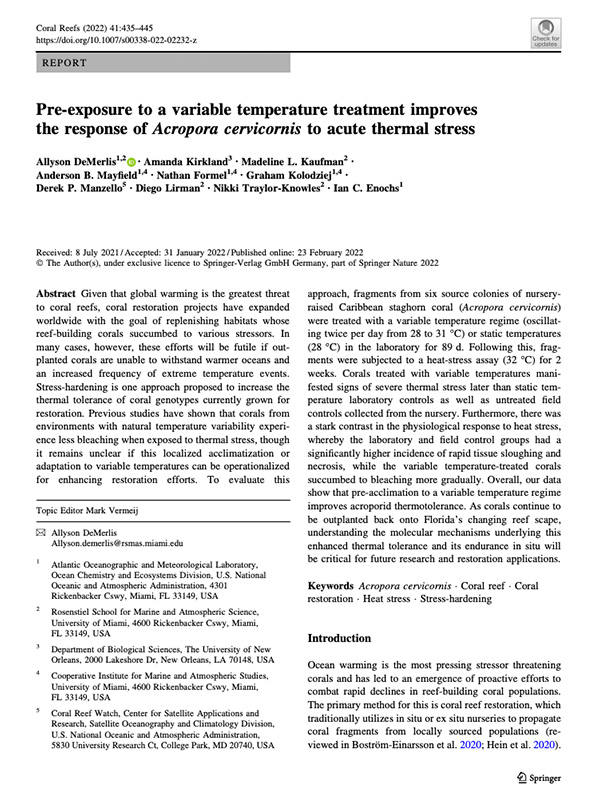DeMerlis, A., Kirkland, A., Kaufman, M. L., Mayfield, A. B., Formel, N., Kolodziej, G., Manzello, D. P., Lirman, D., Traylor-Knowles, N., & Enochs, I. C. (2022). Pre-exposure to a variable temperature treatment improves the response of Acropora cervicornis to acute thermal stress. Coral Reefs, 41(2), 435-445.
Abstract: Given that global warming is the greatest threat to coral reefs, coral restoration projects have expanded worldwide with the goal of replenishing habitats whose reef-building corals succumbed to various stressors. In many cases, however, these efforts will be futile if outplanted corals are unable to withstand warmer oceans and an increased frequency of extreme temperature events. Stress-hardening is one approach proposed to increase the thermal tolerance of coral genotypes currently grown for restoration. Previous studies have shown that corals from environments with natural temperature variability experience less bleaching when exposed to thermal stress, though it remains unclear if this localized acclimatization or adaptation to variable temperatures can be operationalized for enhancing restoration efforts. To evaluate this approach, fragments from six source colonies of nursery-raised Caribbean staghorn coral (Acropora cervicornis) were treated with a variable temperature regime (oscillating twice per day from 28 to 31 °C) or static temperatures (28 °C) in the laboratory for 89 d. Following this, fragments were subjected to a heat-stress assay (32 °C) for 2 weeks. Corals treated with variable temperatures manifested signs of severe thermal stress later than static temperature laboratory controls as well as untreated field controls collected from the nursery. Furthermore, there was a stark contrast in the physiological response to heat stress, whereby the laboratory and field control groups had a significantly higher incidence of rapid tissue sloughing and necrosis, while the variable temperature-treated corals succumbed to bleaching more gradually. Overall, our data show that pre-acclimation to a variable temperature regime improves acroporid thermotolerance. As corals continue to be outplanted back onto Florida’s changing reef scape, understanding the molecular mechanisms underlying this enhanced thermal tolerance and its endurance in situ will be critical for future research and restoration applications.
